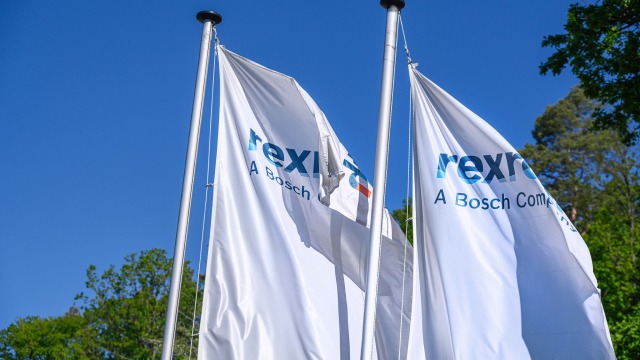



In industrial automation, willingness to embrace greater openness continues to grow – both in terms of technology and the cooperation between the various players. Bosch Rexroth shows what this means in reality, why the degree of automation continues to increase and that the resilience of supply chains as well as sustainability and energy efficiency will shape the sector in 2023.
“In 2023, more and more suppliers in the automation industry will follow the openness trend – a trend for which the course has been set over the last three years. Some automation companies are following the approach that we introduced with ctrlX AUTOMATION in 2019 and are designing their hardware and software systems openly or even helping to develop our automation toolkit through the partner world ctrlX World,” explained Steffen Winkler, Vice President Sales within the Business Unit Automation & Electrification Solutions at Bosch Rexroth. He added: “The future lies not in monolithic structures but in digital ecosystems that allow new forms of connectivity and collaboration as well as a higher degree of automation and simpler workflows.”
The degree of digitalization and automation is increasing
Bosch Rexroth predicts a significantly increased degree of automation for 2023 – driven, among other things, by the permanent need for greater productivity and the resulting competitive pressure with a simultaneous shortage of skilled workers. “The lack of staff still has major consequences for the industry. At the same time, the Corona pandemic has taken its toll and the stricter hygiene rules are placing great demands on our production processes. Accordingly, we see a trend towards even greater reliance on automation,” said Steffen Winkler.
In addition, there is generally increasing demand for automation in some promising industries with products in high demand, for example in electromobility or battery production, warehouse automation and the semiconductor and electrical industries. Completely new areas for automation, for example in smart farming or the (partly) automated preparation of food portions, are also emerging.
Greater sustainability and resilient supply chains
Another big trend will shape automation in 2023: Sustainability and climate protection. The current energy crisis in Europe is speeding up this development. Sustainable production takes into account factors such as zero emissions and the efficient use of resources. At the same time, it must be economical too. This also influences the criteria when selecting automation solutions and, in certain cases, is completely redefining them. More and more energy saving functions are being integrated into automation components – for example a Smart Energy Mode in a servo drive. Among other things, this ensures that energy is kept in the system intelligently and that peak loads are avoided as far as possible. A wide range of tools and models for energy and performance simulation makes it possible to design optimum systems from an energy perspective.
“Reusing valuable automation components is a new trend for greater sustainability. Through professional reconditioning, for example, a used servo motor can be restored to the quality standard of a new product, including a warranty, at a more attractive price. Like “refurbished” smartphones, it allows automation suppliers such as Bosch Rexroth to conserve raw materials even more intelligently, to reduce the overall cost of recycling processes and to take on responsibility for the environment,” explained Steffen Winkler.
“Last but not least, the resilience of supply chains is driving automation suppliers and users this year. Global interruptions to supply chains are one of the biggest challenges in industry these days. Many companies are therefore rethinking their procurement, development and production strategies. They are (once again) starting to involve secondary suppliers or set up parallel manufacturing at at least two sites. These and other measures result in greater stability, planning certainty and ultimately greater sustainability,” said Steffen Winkler, looking ahead.
Media Assets
Basic Information Bosch Rexroth
As one of the world’s leading suppliers of drive and control technologies, Bosch Rexroth ensures efficient, powerful and safe movement in machines and systems of any size. The company bundles global application experience in the market segments of Mobile Applications, Machinery Applications and Engineering, and Factory Automation. With its intelligent components, customized system solutions and services, Bosch Rexroth is creating the necessary environment for fully connected applications. Bosch Rexroth offers its customers hydraulics, electric drive and control technology, gear technology and linear motion and assembly technology, including software and interfaces to the Internet of Things. With locations in over 80 countries, more than 31,000 associates generated sales revenue of around 6.2 billion euros in 2021.
Basic Information Bosch
The Bosch Group is a leading global supplier of technology and services. It employs roughly 402,600 associates worldwide (as of December 31, 2021). The company generated sales of 78.7 billion euros in 2021. Its operations are divided into four business sectors: Mobility Solutions, Industrial Technology, Consumer Goods, and Energy and Building Technology. As a leading IoT provider, Bosch offers innovative solutions for smart homes, Industry 4.0, and connected mobility. Bosch is pursuing a vision of mobility that is sustainable, safe, and exciting. It uses its expertise in sensor technology, software, and services, as well as its own IoT cloud, to offer its customers connected, cross-domain solutions from a single source. The Bosch Group’s strategic objective is to facilitate connected living with products and solutions that either contain artificial intelligence (AI) or have been developed or manufactured with its help. Bosch improves quality of life worldwide with products and services that are innovative and spark enthusiasm. In short, Bosch creates technology that is “Invented for life.” The Bosch Group comprises Robert Bosch GmbH and its roughly 440 subsidiary and regional companies in some 60 countries. Including sales and service partners, Bosch’s global manufacturing, engineering, and sales network covers nearly every country in the world. With its more than 400 locations worldwide, the Bosch Group has been carbon neutral since the first quarter of 2020. The basis for the company’s future growth is its innovative strength. At 128 locations across the globe, Bosch employs some 76,100 associates in research and development, of which more than 38,000 are software engineers.
Press Contact

Spokesperson technology topics
Manuela Kessler
+49 9352 18-4145
Manuela.Kessler@boschrexroth.de